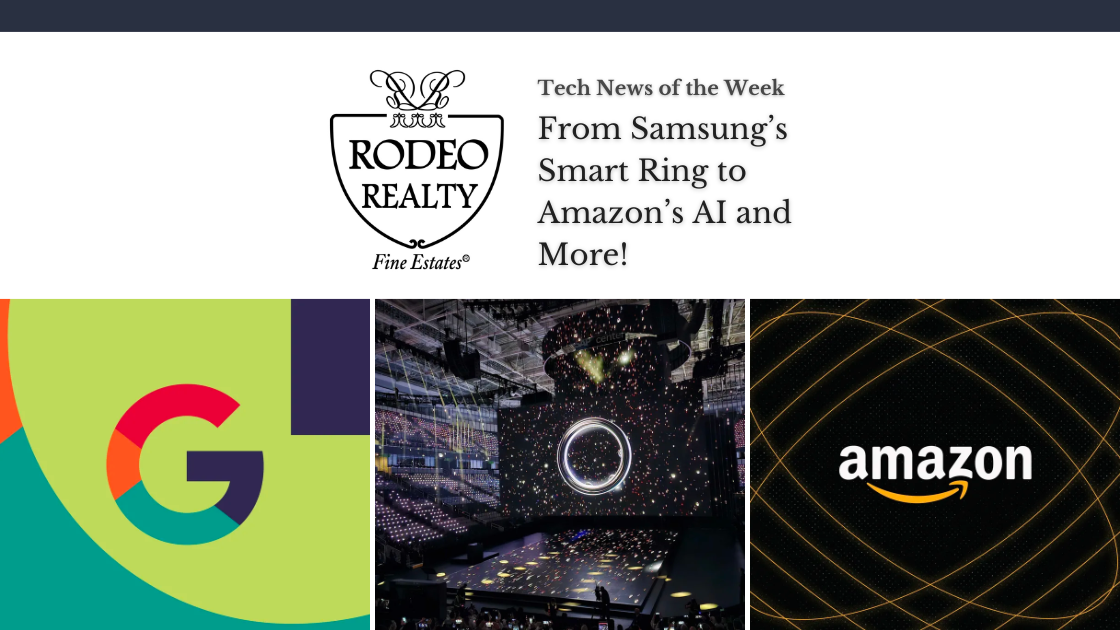Stay up to date with the latest in tech news! Check out this week’s blog of major headlines from Samsung’s Smart Ring to Amazon’s AI and more, we have you covered. Read on below for what’s happening from across the World Wide Web.
Amazon’s Latest AI Chatbot Offers Responses, Humor, and Style Tips Inspired by Jeff Bezos

Amazon is testing a new AI feature in its iOS and Android mobile apps, allowing customers to ask specific product-related questions. This AI tool can provide detailed information about products, such as dimensions, battery life, and even creative content like Christmas carols about snow boots. While primarily designed for practical queries, the tool can also handle whimsical requests, creating jokes, bedtime stories, and flirty descriptions about products like flash card readers and hard drives. However, it doesn’t engage in personal flirtation. Currently available to a limited number of users, the feature is part of Amazon’s broader implementation of AI in its retail services. This includes using AI to summarize product reviews, detecting fake reviews, and suggesting clothing sizes. Amazon’s enterprise cloud division, AWS, has also been developing generative AI, recently launching the Titan Image Generator for text-to-image prompts and providing access to other major AI models for enterprise customers.
Notion Launches a New Calendar App to Streamline Meeting Organization

Notion is responding to user demand by introducing Notion Calendar, a standalone app that seamlessly integrates with Notion’s databases and notes. This development is part of Notion’s strategy to become an all-in-one solution for business needs. The app, essentially a revamped version of the Cron calendar app acquired by Notion in 2022, offers features like Calendly-style booking, a command bar for scheduling, and the ability to prevent double-booking across personal and work calendars. Its key new feature is the integration with Notion, allowing users to link documents and databases within calendar events, streamlining the management of agendas and notes. The company is continuously evolving, adding features like AI, messaging, automated workflows, and app integrations, aiming to replace traditional business tools like email, presentation software, and possibly even challenging Excel.
Samsung Develops a Smart Ring Technology

Samsung recently announced its venture into smart ring technology with the Galaxy Ring. Likewise, Samsung describes the product as a “powerful and accessible” health and wellness device. The Galaxy Ring was only briefly showcased in a video, with limited details provided. Samsung has not disclosed the release date or pricing for the device. The move into smart ring technology aligns with current trends. Samsung’s interest in this area was hinted at last year when they filed a patent. Of course, it is anticipated that the Galaxy Ring will also incorporate AI-powered tools. More information about the Galaxy Ring is eagerly awaited.
Google Maps Introduces In-Tunnel Navigation Feature

Google Maps is enhancing its navigation capabilities in tunnels with a new feature that utilizes Bluetooth beacons. This improvement addresses the common issue of GPS systems losing direction inside tunnels, where signals are often weak or unavailable. The feature, first noticed by SmartDroid, is currently available on the Android version of Google Maps. It operates by using Bluetooth beacons installed in tunnels to transmit location data to the user’s phone. This data allows Google Maps to offer real-time traffic information as it would with a standard GPS connection. However, the effectiveness of this feature depends on the presence of Bluetooth beacons in the tunnels. Waze has already implemented this technology and has partnerships in several global cities where beacons are installed. It’s unclear if Google Maps will use the same beacons. The rollout of this feature began in October 2023 and appears to be expanding.
Apple Updates App Store Policies to Allow US Developers to Direct Users to External Payment Options

Apple has revised its App Store policies, now allowing developers to link to external payment platforms, as reported by 9to5Mac. Despite this change, Apple will still collect a commission from developers using outside payment methods. The new rules require developers to apply for an “entitlement” to use alternative payment methods. Additionally, developers must still offer Apple’s in-app purchase system alongside external payment options.
